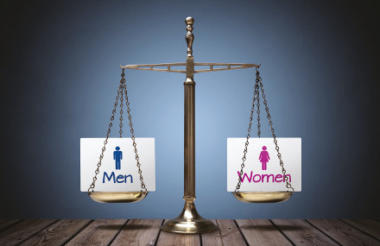There is a “profound” gender imbalance at UK charities due to women being underrepresented in positions of power despite the sector’s largely female workforce, researchers have warned.
Pro Bono Economics’ report says women make up 68% of the charity sector’s employees but between 56% and 63% of its chief executives, according to its analysis of ACEVO’s pay and equalities surveys.
It says that larger and more established charities are mostly led by men, as 46% of CEOs at voluntary organisations set up before 1945 and 34% of those at the largest 100 by income are women.
The report references the Charity Commission’s Taken on Trust report in 2017, which showed that while women were more likely to volunteer than men, male trustees outnumbered female trustees by two to one.
It also highlights that women are more generous than men, with 72% of women giving to charity compared to 61% of men, but they are less likely to be major philanthropists.
Women account for fewer than 11% of high-net-worth individuals, while seven women featured in the Sunday Times Giving List independently last year compared to 69 men.
‘Dominance of men has consequences’
“This dominance of men in positions of power in the charity sector; at leadership level, at board level, and in philanthropy, has consequences,” the report says.
“The prejudices, misogyny and sexism, which affect women at work and women in leadership across all sectors of the economy, are prevalent in the charity sector too.
“Women and girls’ charities are too often deprioritised and are chronically underfunded. Gender stereotypes about the types of roles women ‘should’ be doing persist and are felt to affect team make-up.
“Women running charities still balance the majority of the responsibilities for caring and the home, and this impacts the shape of their careers.
“Women in the charity sector can be and are underestimated and undermined. They can and do experience discrimination, tokenism, objectification, and harassment.
“All of this is felt most keenly by women of colour, disabled women, LGBT+ women, and other women in the sector who face forms of systemic disempowerment. It also plays out differently at different points in women’s lives.”
Gender equality ‘taken for granted’ in sector
The report says that gender equality in the charity sector “is often taken for granted because the charity sector can ‘feel’ very female as a result of its workforce”.
It urges grantmakers to increase funding for women and girls’ organisations and calls for infrastructure bodies to reach beyond their current audience to support women unaware of their services.
Currently, 1.8% of grants go to women’s and girls’ organisations, according to research published by foundation Rosa this year.
Pro Bono Economics’ report says charity boards need to be more proactive in raising issues that affect women, including reviewing benefits, fair pay, leave arrangements, flexible working and policies to ensure that they are family-friendly, supportive of caring responsibilities, and competitive.
“Boards could be offering more encouragement to the female leaders in their organisations to make time and resources available for their own development as leaders,” it says.
“It is also essential that boards continue to make progress on recruiting trustees from more diverse backgrounds, and go further to ensure that all trustees feel included, able to contribute and are listened to equally.”
Vicky Pryce: Gender equality progress will make charity sector more effective
Vicky Pryce, Pro Bono Economics patron and economist, said: “As a patron and trustee of a number of women’s charities, the evidence presented in this Pro Bono Economics report is a powerful reminder of the gender imbalance that exists in the charity sector today.
“Progress in addressing this imbalance in recent years has been welcome, but, as the report shows, there is still much to do to achieve a charity sector that is more reflective of its workforce and users.
“The drive to achieve this is essential not only for a fairer charity sector, but also a more effective one, along with the wider and significant societal benefits that will follow.”












